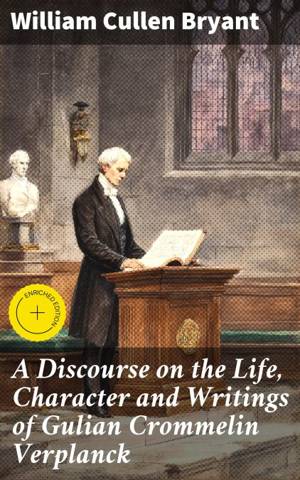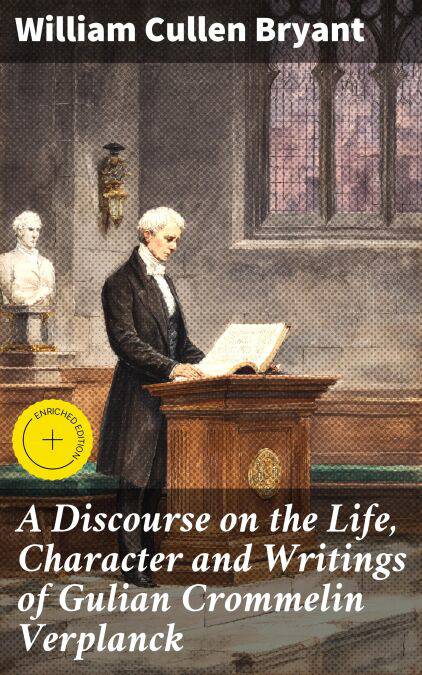
Bedankt voor het vertrouwen het afgelopen jaar! Om jou te bedanken bieden we GRATIS verzending (in België) aan op alles gedurende de hele maand januari.
- Afhalen na 1 uur in een winkel met voorraad
- In januari gratis thuislevering in België
- Ruim aanbod met 7 miljoen producten
Bedankt voor het vertrouwen het afgelopen jaar! Om jou te bedanken bieden we GRATIS verzending (in België) aan op alles gedurende de hele maand januari.
- Afhalen na 1 uur in een winkel met voorraad
- In januari gratis thuislevering in België
- Ruim aanbod met 7 miljoen producten
Zoeken
A Discourse on the Life, Character and Writings of Gulian Crommelin Verplanck E-BOOK
Enriched edition. Exploring the Legacy of a Literary Scholar and Politician
William Cullen Bryant
E-book | Engels
€ 1,99
+ 1 punten
Omschrijving
In "A Discourse on the Life, Character and Writings of Gulian Crommelin Verplanck," William Cullen Bryant presents a profound exploration of Verplanck's contributions to American literature and culture. Written in a reflective and eloquent style characteristic of Bryant's Romantic sensibilities, this discourse delves into the intricacies of Verplanck's literary achievements, his role as a critic, and his commitment to civic duty. Contextually situated within the early 19th-century intellectual landscape, Bryant's work not only honors Verplanck but also serves as an insightful commentary on the literary and moral imperatives of the time, blending biographical narrative with critical analysis. Bryant, an esteemed poet and journalist, was deeply influenced by the cultural currents of his era, including the burgeoning American identity and the call for a uniquely American literary voice. His own experiences as a writer and public figure inform his admiration for Verplanck, a notable advocate for ethical literature and a key figure in ensuring that American writers gained recognition alongside their European counterparts. This background enriches the text, reflecting Bryant's aspirations for American letters and culture. Readers seeking to understand the foundations of American literary identity and the significant figures contributing to its shaping will find this discourse invaluable. Bryant's scholarly dedication presents Verplanck not merely as a subject of homage but as a vital link in the narrative of American literary history, offering an engaging and enriching experience for scholars and casual readers alike.
In this enriched edition, we have carefully created added value for your reading experience:
- A succinct Introduction situates the work's timeless appeal and themes.
- The Synopsis outlines the central plot, highlighting key developments without spoiling critical twists.
- A detailed Historical Context immerses you in the era's events and influences that shaped the writing.
- A thorough Analysis dissects symbols, motifs, and character arcs to unearth underlying meanings.
- Reflection questions prompt you to engage personally with the work's messages, connecting them to modern life.
- Hand‐picked Memorable Quotes shine a spotlight on moments of literary brilliance.
- Interactive footnotes clarify unusual references, historical allusions, and archaic phrases for an effortless, more informed read.
In this enriched edition, we have carefully created added value for your reading experience:
- A succinct Introduction situates the work's timeless appeal and themes.
- The Synopsis outlines the central plot, highlighting key developments without spoiling critical twists.
- A detailed Historical Context immerses you in the era's events and influences that shaped the writing.
- A thorough Analysis dissects symbols, motifs, and character arcs to unearth underlying meanings.
- Reflection questions prompt you to engage personally with the work's messages, connecting them to modern life.
- Hand‐picked Memorable Quotes shine a spotlight on moments of literary brilliance.
- Interactive footnotes clarify unusual references, historical allusions, and archaic phrases for an effortless, more informed read.
Specificaties
Betrokkenen
- Auteur(s):
- Uitgeverij:
Inhoud
- Aantal bladzijden:
- 36
- Taal:
- Engels
Eigenschappen
- Productcode (EAN):
- 4066339537064
- Verschijningsdatum:
- 11/08/2023
- Uitvoering:
- E-book
- Beveiligd met:
- Digital watermarking
- Formaat:
- ePub

Alleen bij Standaard Boekhandel
+ 1 punten op je klantenkaart van Standaard Boekhandel
Beoordelingen
We publiceren alleen reviews die voldoen aan de voorwaarden voor reviews. Bekijk onze voorwaarden voor reviews.









